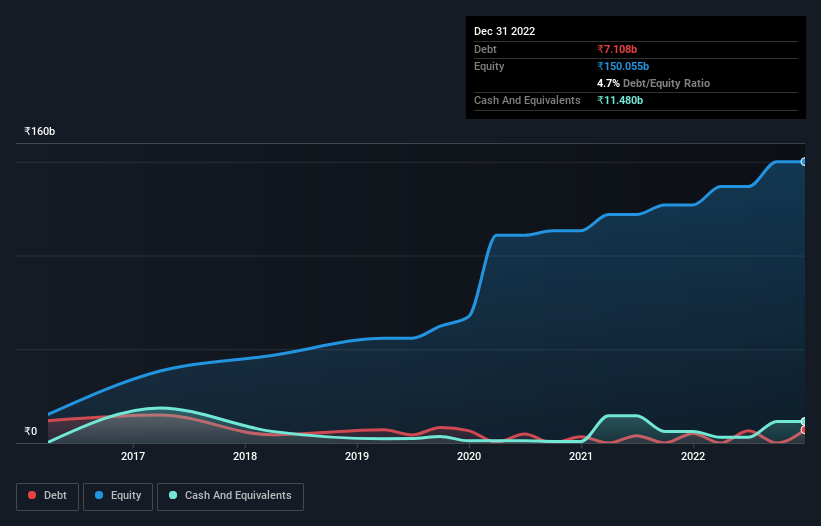- India
- /
- Food and Staples Retail
- /
- NSEI:DMART
Avenue Supermarts (NSE:DMART) Has A Pretty Healthy Balance Sheet

David Iben put it well when he said, 'Volatility is not a risk we care about. What we care about is avoiding the permanent loss of capital.' It's only natural to consider a company's balance sheet when you examine how risky it is, since debt is often involved when a business collapses. As with many other companies Avenue Supermarts Limited (NSE:DMART) makes use of debt. But the more important question is: how much risk is that debt creating?
When Is Debt A Problem?
Debt and other liabilities become risky for a business when it cannot easily fulfill those obligations, either with free cash flow or by raising capital at an attractive price. If things get really bad, the lenders can take control of the business. However, a more usual (but still expensive) situation is where a company must dilute shareholders at a cheap share price simply to get debt under control. Having said that, the most common situation is where a company manages its debt reasonably well - and to its own advantage. The first step when considering a company's debt levels is to consider its cash and debt together.
Check out our latest analysis for Avenue Supermarts
What Is Avenue Supermarts's Debt?
As you can see below, at the end of September 2022, Avenue Supermarts had ₹7.11b of debt, up from ₹5.10b a year ago. Click the image for more detail. However, it does have ₹11.5b in cash offsetting this, leading to net cash of ₹4.37b.

How Healthy Is Avenue Supermarts' Balance Sheet?
The latest balance sheet data shows that Avenue Supermarts had liabilities of ₹15.3b due within a year, and liabilities of ₹6.10b falling due after that. Offsetting this, it had ₹11.5b in cash and ₹645.0m in receivables that were due within 12 months. So it has liabilities totalling ₹9.24b more than its cash and near-term receivables, combined.
This state of affairs indicates that Avenue Supermarts' balance sheet looks quite solid, as its total liabilities are just about equal to its liquid assets. So while it's hard to imagine that the ₹2.30t company is struggling for cash, we still think it's worth monitoring its balance sheet. Despite its noteworthy liabilities, Avenue Supermarts boasts net cash, so it's fair to say it does not have a heavy debt load!
On top of that, Avenue Supermarts grew its EBIT by 56% over the last twelve months, and that growth will make it easier to handle its debt. When analysing debt levels, the balance sheet is the obvious place to start. But ultimately the future profitability of the business will decide if Avenue Supermarts can strengthen its balance sheet over time. So if you want to see what the professionals think, you might find this free report on analyst profit forecasts to be interesting.
Finally, a company can only pay off debt with cold hard cash, not accounting profits. While Avenue Supermarts has net cash on its balance sheet, it's still worth taking a look at its ability to convert earnings before interest and tax (EBIT) to free cash flow, to help us understand how quickly it is building (or eroding) that cash balance. During the last three years, Avenue Supermarts burned a lot of cash. While investors are no doubt expecting a reversal of that situation in due course, it clearly does mean its use of debt is more risky.
Summing Up
While it is always sensible to look at a company's total liabilities, it is very reassuring that Avenue Supermarts has ₹4.37b in net cash. And we liked the look of last year's 56% year-on-year EBIT growth. So we don't have any problem with Avenue Supermarts's use of debt. When analysing debt levels, the balance sheet is the obvious place to start. But ultimately, every company can contain risks that exist outside of the balance sheet. For example, we've discovered 1 warning sign for Avenue Supermarts that you should be aware of before investing here.
When all is said and done, sometimes its easier to focus on companies that don't even need debt. Readers can access a list of growth stocks with zero net debt 100% free, right now.
New: Manage All Your Stock Portfolios in One Place
We've created the ultimate portfolio companion for stock investors, and it's free.
• Connect an unlimited number of Portfolios and see your total in one currency
• Be alerted to new Warning Signs or Risks via email or mobile
• Track the Fair Value of your stocks
Have feedback on this article? Concerned about the content? Get in touch with us directly. Alternatively, email editorial-team (at) simplywallst.com.
This article by Simply Wall St is general in nature. We provide commentary based on historical data and analyst forecasts only using an unbiased methodology and our articles are not intended to be financial advice. It does not constitute a recommendation to buy or sell any stock, and does not take account of your objectives, or your financial situation. We aim to bring you long-term focused analysis driven by fundamental data. Note that our analysis may not factor in the latest price-sensitive company announcements or qualitative material. Simply Wall St has no position in any stocks mentioned.
About NSEI:DMART
Avenue Supermarts
Engages in the business of organized retail and operating supermarkets under the D-Mart brand name in India.
Flawless balance sheet with reasonable growth potential.


